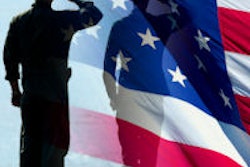
A Dallas-based investigative reporter has been working to find the source of oral health problems plaguing a number of U.S. soldiers returning from the war in Iraq.
While the soldiers that Byron Harris of WFAA News 8 interviewed for a recent story all went to Iraq with healthy mouths, they returned with teeth that turned gray in color, became weak, and ultimately broke. One soldier described the experience as more painful and debilitating than when his back and multiple limbs were injured by a blast from an improvised explosive device.
 Byron Harris, an investigative reporter with WFAA-TV in Dallas. Image courtesy of WFAA.
Byron Harris, an investigative reporter with WFAA-TV in Dallas. Image courtesy of WFAA.
To make matters worse, unless a soldier is 100% disabled, the U.S. Department of Veterans Affairs (VA) will not cover the cost of dental care, according to Harris. In addition, the VA does not keep statistical information about chronic dental problems among Iraq veterans, he noted. Another challenge: "They're supposed to give you an exit dental checkup from the army -- none of these guys got them," Harris said.
But after his story about the veterans aired on WFAA News 8, Harris has managed to connect some of them with dentists who are providing free treatment. And he continues to work to unravel the cause of their issues.
"These are vets with bad teeth and little money. They are outliers in the VA system, which doesn't pay [for] dental [care]. Clearly, there are victims out there that are crying for help," Harris told DrBicuspid.com. "But the source of their trouble is a mystery."
Three veterans he interviewed for the article -- Sgt. Steve White, Spc. Stevie Chebahtah, and Spc. Brad Gotschall -- all served together in Mosul, Iraq, in the 293rd Military Police Company, and they say their dental problems first began appearing eight years ago. Harris learned of their plight through a Rancho Mirage, CA-based nonprofit called Rebuilding America's Warriors (RAW), formerly called the Iraq Star Foundation.
"The source had heard about these guys for two to three years, but he wasn't a dentist, he was a plastic surgeon," Harris explained.
When he tracked down each veteran, he learned that White had six carious lesions since returning from Iraq and Chebahtah had 13. Gotchall's situation was more severe: Two months after his return, he noticed brown spots on his teeth. Three painful trips to the emergency room followed, once to treat a softball-sized swollen cheek, according to Harris. He eventually lost most of his teeth.
Another soldier, Daniel Rogers, found the pain in his teeth so severe that he could barely brush his teeth and lost weight when eating became difficult. The dentists Rogers saw could not explain his periodontal disease, he told Harris. But there is agreement among the practitioners Harris spoke with that the poor state of their oral health is related to their time in Iraq.
Mistaken for meth mouth
DrBicuspid.com brought Harris's story to Leila Jahangiri, BDS, DMD, MMSc, chair of the department of prosthodontics at the New York University College of Dentistry. Two years ago, Dr. Jahangiri unraveled another oral health mystery when she traced a man's rapid enamel loss to an overly acidic pool he swam in daily. Her response to the war veterans' oral issues was one Harris and the veterans had heard from other doctors.
"My initial reaction, seeing a high volume of problems, seeing odd things, was that it was meth mouth," Dr. Jahangiri said. "This was not typical xerostomia."
“These are vets with bad teeth and little money.”
But Harris disagreed. "I ran this by a lot of dentists, showed them photos of their mouths and the first reaction from everyone was that it was meth mouth," he said. "I took care to investigate the backgrounds of these vets. They are definitely not meth users." Nor did any of them complain of dry mouth in general.
Dr. Jahangiri had other suggestions. "If they had candy that they saved from, say, Christmastime when they may have been sent sweets and sucked on them all day, they would not put on weight, but if they hadn't brushed, they'd be feeding bacteria all the time."
Meal, Ready-to-Eat (MRE) packets that are given to soldiers are high in starch and often have M&Ms or Jolly Rancher candy in them, so Harris saw this as a possibility, albeit an unlikely one. During his interviews, Harris questioned the soldiers about their oral health maintenance.
"For one guy on patrol, he said there were days when the stress of combat led him to not think about brushing, while another guy did brush twice a day," he said. "So I don't think oral hygiene is the cause in this situation."
The location of the decay also is relevant, Dr. Jahingiri noted. "It is all over the mouth? Then the ingestion of Coke or a sugary beverage could be to blame," she said.
According to Harris, for two veterans the decay was in the front of their mouths. He also ruled out energy drinks and other sugary beverages as a cause.
"There were no energy drinks in the theater," Harris said. "Everybody said sugary drinks just didn't exist at that point in the war. They had trouble enough getting them water."
Water issues
But water may just be at the heart of this issue. There have been reports of quality issues with the water provided by military contractor KBR; according to a 2008 article in the Washington Post, treated but untested chlorinated wastewater was given to U.S. troops at the Qayyarah Airfield West roughly 180 miles north of Baghdad. The water, which was produced using reverse-osmosis purification and treated with chlorine, was used for latrines and showers from March 2004 through February 2006. Illnesses "such as skin abscesses, cellulites, skin infections, and diarrhea" were attributed to the water, the article noted. In audits of other bases, KBR was cited for lax oversight of the drinking water it provided and for not meeting field water sanitary standards.
Harris believes the veterans he interviewed drank a lot of chlorinated water while in Iraq. "I'm quite sure that it was heavily chlorinated," he said. Yet he remains skeptical that water is to blame, given that the decay was isolated to the front teeth of two veterans' mouths, and soldiers typically drank bottled water supplied by contractors (although Chebahtah noted that she sometimes had to drink local bottled water labeled in another language).
During interviews with dentists, "I asked the long-range question: Can water cause these problems? The answer appears to be no," Harris said. The VA also has rejected water as the cause of the soldiers' oral health issues.
Despite running into several dead ends, Harris continues to look for answers. For example, mapping could help discover or rule out causation. Mosul, where Sgt. White, Spc. Chebahtah, and Spc. Gotschall were stationed, is roughly 30 miles from the Qayyarah airfield where KBR's water issues were highlighted. Rogers, however, was stationed near Sadr City in Baghdad, hundreds of miles to the south.
"Going forward, I'm trying to build a database of how many [affected soldiers] there are, where they were, and what they were exposed to," he said. "The Ramallah oil fields, for example, have lots of heavy metals and nasty chemicals like hydrogen sulfide and hydrogen chloride associated with drilling in the environment."
The good news? Since Harris' story aired, RAW has managed to connect Rogers and Gotschall with dentists who have volunteered care for them. And Harris is hoping more dentists will help others affected by this mystery.
"Some dentists have stepped up to give implants to some of these vets, and that's really cool," Harris said.
Harris, while trying to get to the source of Iraq veterans' oral health problems, is also seeking those that might treat them. He can be reached at mailto:[email protected].



















